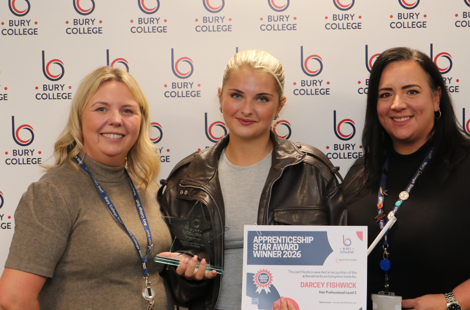
Read how Codi has used the skills of her Catering course at Bury College to support her journey to becoming a restaurant owner.
This qualification will enable you to develop the knowledge and skills needed when supporting teaching and learning in primary, secondary or special schools. It covers a wide range of areas including children and young people’s development, supporting those with disabilities or special educational needs, communication and professional relationships. The training provides you with knowledge for roles that support teaching in the classroom, including special needs assistants, behaviour support assistant/coordinator, foundation assistant.
Key Knowledge, Skills and Behaviours
An apprenticeship is a real job where you learn, gain experience and get paid. By the end of an apprenticeship, you'll have the right skills and knowledge needed for your chosen career.
As an apprentice you will:
There are different rates of pay for apprentices depending on your age and what year of your apprenticeship you’re in.
Your employment contract should confirm your rate of pay.
Please visit https://www.gov.uk/become-apprentice/pay-and-conditions for the latest minimum apprenticeship wages.
You will attend college classes taking place one day per month and will also receive one-to-one support in the workplace with a dedicated Learning and Skills Coach.
You will complete an End Point Assessment with the awarding body NCFE and will cover the following areas:
Relevant qualifications and/or an initial assessment and diagnostic testing on maths and English will take place prior to commencement.
Positive Futures is a set of essential qualities, embedded throughout your study programme, that we seek to develop in all students:
You will also engage in the Positive Futures Careers Programme, developing key employability skills through a diverse range of activities including work placements, volunteering, employer talks, industry study visits and employment and university fairs.
As a Bury College student you will have access to a wide range of enrichment opportunities which will contribute to your personal growth and development and support your academic studies.
These may include:
Please Note: We attempt to ensure that all information contained within this website is correct and up-to-date. However, some details may change as we review and update our provision. Although every effort is made to provide the teaching, examination, assessment and other services detailed on this website and in our other publications, Bury College cannot guarantee the provision of such programmes, services, facilities and fees. Bury College reserves the right to amend, withdraw, alter or amalgamate any of the courses, locations and facilities detailed within at any time. Should circumstances require such amendments, Bury College undertakes to use all reasonable steps to minimise the resultant disruption to those services and most importantly to students.


Read how Codi has used the skills of her Catering course at Bury College to support her journey to becoming a restaurant owner.

Bury College welcomed a delegation from China and guests from the University of Salford for a curriculum showcase visit focused on vocational education, technical skills and international collaboration.

National Apprenticeship Week was an exciting and inspiring time at Bury College, filled with activities that helped mark the occasion and celebrate the exceptional talent, dedication and achievements of Apprentices.

On Monday 9th February, Bury College’s Hairdressing Apprentices came together for a charity Blowdryathon, raising almost £500 for Little Lady Locks during National Apprenticeship Week!
_470x310.png)
On Wednesday 11th February, as part of National Apprenticeship Week celebrations, Bury College proudly hosted an Apprenticeship Star Awards Ceremony.
_470x310.png)
Employers - did you know that now is the perfect time to start thinking about your school leaver Apprenticeship vacancies?